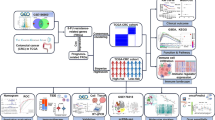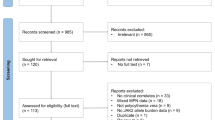Abstract
We sought to find blood-based biomarkers that can be used to predict efficacy in advanced non-small cell lung cancer patients treated with bevacizumab plus chemotherapy. Blood was collected before treatment and after 6 weeks of therapy from patients who were participating in a phase 4 trial. Plasma vascular endothelial growth factor (VEGF) levels were evaluated by ELISA. A total of eight single nucleotide polymorphisms in four candidate genes were analyzed by PCR and sequencing. A total of 45 patients enrolled in a clinical trial at Guangdong General Hospital between August 2007 and March 2008 were used as subjects. The median survival times of OS was 25.6 and 13.4 months in the low and high groups, respectively, when the median posttreatment plasma VEGF level (46.63 pg/ml) was used as the cut-off point (P = 0.0284). Patients carrying the AA genotype at the −6C > A polymorphism in laminin 5 (LN5) were more likely to exhibit reduced hemoglobin compared with patients carrying the CA/CC genotype (OR = 8.364, χ2 = 5.34, P = 0.021). Similar associations were found at the −89A > G and −260C > A polymorphisms in LN5. Patients with the CC genotype at the −6C > A polymorphism in LN5 had an increased risk of neutropenia than those with the CA/AA genotype (OR = 4.444, χ2 = 5.116, P = 0.030). Our results show improved survival in patients with lower posttreatment plasma VEGF levels treated with bevacizumab plus chemotherapy; thus, the posttreatment plasma VEGF level may be a promising biomarker to predict clinical benefit early in the course of therapy. Polymorphisms in LN5 were associated with a reduced level of hemoglobin and neutropenia.


Similar content being viewed by others
References
Wheatley-Price P, Shepherd FA. Targeting angiogenesis in the treatment of lung cancer. J Thorac Oncol. 2008;3:1173–84.
Sandler A, et al. Paclitaxel-carboplatin alone or with bevacizumab for non-small cell lung cancer. N Engl J Med. 2006;355:2542–50.
Reck M, et al. Overall survival with cisplatin-gemcitabine and bevacizumab or placebo as first-line therapy for nonsquamous non-small cell lung cancer: results from a randomised phase III trial (AVAiL). Ann Oncol. 2010;21:1804–9.
Amir E, et al. Antivascular agents for non-small cell lung cancer: current status and future directions. Expert Opin Investig Drugs. 2009;18:1667–86.
Crinò L, et al. Safety and efficacy of first-line bevacizumab-based therapy in advanced non-squamous non-small cell lung cancer (SAiL, MO19390): a phase 4 study. Lancet Oncol. 2010;11:733–40.
Ferrara N, Gerber HP, LeCouter J. The biology of VEGF and its receptors. Nat Med. 2003;9:669–76.
Willett CG, et al. Direct evidence that the VEGF-specific antibody bevacizumab has antivascular effects in human rectal cancer. Nat Med. 2004;10:145–7.
Baluk P, Hashizume H, McDonald DM. Cellular abnormalities of blood vessels as targets in cancer. Curr Opin Genet Dev. 2005;15:102–11.
Jain RK. Normalization of tumor vasculature: an emerging concept in antiangiogenic therapy. Science. 2005;307:58–62.
Jain RK. Normalizing tumor vasculature with anti-angiogenic therapy: a new paradigm for combination therapy. Nat Med. 2001;7:987–9.
Saijo N, Kenmotsu H. Recent development of molecular-targeted drugs in lung cancer. Intern Med. 2010;49:1923–34.
Inai T, et al. Inhibition of vascular endothelial growth factor (VEGF) signaling in cancer causes loss of endothelial fenestrations, regression of tumor vessels, and appearance of basement membrane ghosts. Am J Pathol. 2004;165:35–52.
Evans WE, Relling MV. Pharmacogenomics: translating functional genomics into rational therapeutics. Science. 1999;286:487–91.
Schneider BP, et al. Association of vascular endothelial growth factor and vascular endothelial growth factor receptor-2 genetic polymorphisms with outcome in a trial of paclitaxel compared with paclitaxel plus bevacizumab in advanced breast cancer: ECOG 2100. J Clin Oncol. 2008;26:4672–8.
An SJ, et al. The -271 G > A polymorphism of kinase insert domain-containing receptor gene regulates its transcription level in patients with non-small cell lung cancer. BMC Cancer. 2009;9:144.
Huang YS, An SJ, Chen ZH, Wu YL. Three cases of severe hepatic impairment caused by erlotinib. Br J Clin Pharmacol. 2009;68:464–7.
Vroling L, et al. CD133 + circulating haematopoietic progenitor cells predict for response to sorafenib plus erlotinib in non-small cell lung cancer patients. Br J Cancer. 2010;102:268–75.
Wagstaff AJ, Keam SJ, McCormack PL. Bevacizumab plus platinum-based chemotherapy: in advanced non-small cell lung cancer. BioDrugs. 2009;23:187–96.
Sandler A, et al. Paclitaxel-carboplatin alone or with bevacizumab for non-small cell lung cancer. N Engl J Med. 2006;355:2542–50.
Nikolinakos PG, et al. Plasma cytokine and angiogenic factor profiling identifies markers associated with tumor shrinkage in early-stage non-small cell lung cancer patients treated with pazopanib. Cancer Res. 2010;70:2171–9.
Hanrahan EO, et al. Distinct patterns of cytokine and angiogenic factor modulation and markers of benefit for vandetanib and/or chemotherapy in patients with non-small cell lung cancer. J Clin Oncol. 2010;28:193–201.
Miyazaki K. Laminin-5 (laminin-332): unique biological activity and role in tumor growth and invasion. Cancer Sci. 2006;97:91–8.
Fukai Y, et al. Correlation between laminin-5 gamma2 chain and epidermal growth factor receptor expression in esophageal squamous cell carcinomas. Oncology. 2005;69:71–80.
Giannelli G, et al. ZD6474 inhibits proliferation and invasion of human hepatocellular carcinoma cells. Biochem Pharmacol. 2006;71:479–85.
Acknowledgments
We wish to thank Drs. Hong-Yan Tang, Hong-Sui Wu, and Shi-Liang Chen for their assistance with sample collection. This work was supported by grants from the National Natural Science Foundation of China (No. 30772531), Guangdong Provincial Medical Science and Technology Research Foundation (B2006001), and China Postdoctoral Science Foundation (20060400212).
Author information
Authors and Affiliations
Corresponding author
Electronic supplementary material
Below is the link to the electronic supplementary material.
Rights and permissions
About this article
Cite this article
An, SJ., Huang, YS., Chen, ZH. et al. Posttreatment plasma VEGF levels may be associated with the overall survival of patients with advanced non-small cell lung cancer treated with bevacizumab plus chemotherapy. Med Oncol 29, 627–632 (2012). https://doi.org/10.1007/s12032-011-9924-x
Received:
Accepted:
Published:
Issue Date:
DOI: https://doi.org/10.1007/s12032-011-9924-x




